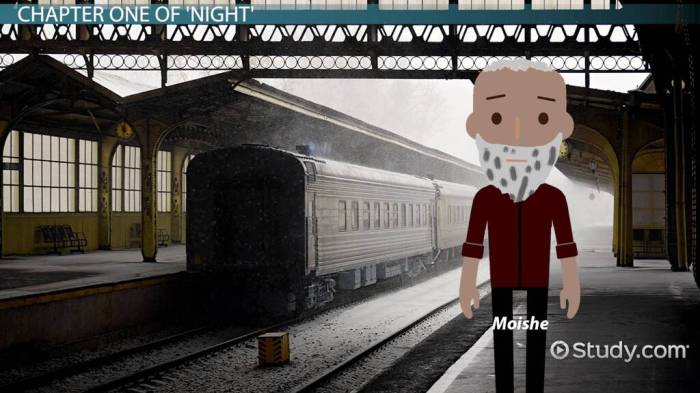Night elie wiesel chapter 2 summary – In “Night” by Elie Wiesel, Chapter 2 presents a harrowing account of the prisoners’ arrival at Auschwitz, a turning point that marks the beginning of their dehumanization and unimaginable suffering. As we delve into this chapter, we will explore the horrors inflicted upon the prisoners, their struggles to maintain their humanity, and the profound impact of these experiences on their lives.
The arrival at Auschwitz marks a profound shift in the prisoners’ existence. They are stripped of their identities, reduced to mere numbers, and subjected to a dehumanizing process that aims to break their spirits. The selection process, a cruel lottery of life and death, weighs heavily on their minds, leaving them in a state of constant fear and uncertainty.
The Arrival at Auschwitz
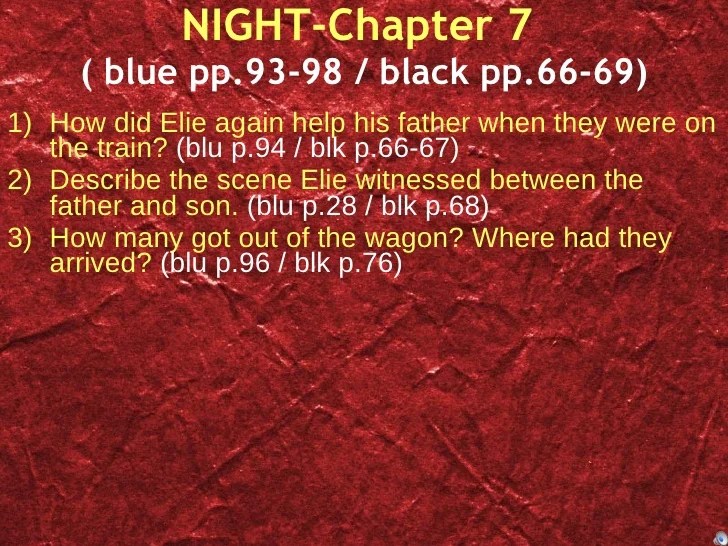
The arrival at Auschwitz marked a pivotal moment in the prisoners’ lives, as they were subjected to a dehumanizing process that stripped them of their identity and individuality.
Upon arrival, the prisoners were herded into a selection process, where they were separated into two groups: those deemed fit for labor and those destined for immediate death. This process was both physically and emotionally taxing, as the prisoners witnessed the arbitrary nature of their fate.
The Dehumanizing Process
- Prisoners were stripped of their clothes, belongings, and hair.
- They were assigned numbers to replace their names.
- They were subjected to harsh physical labor and psychological torment.
The Loss of Identity and Individuality
The dehumanizing process at Auschwitz had a profound impact on the prisoners’ sense of identity and individuality. Stripped of their names, possessions, and personal histories, they became mere numbers, indistinguishable from one another.
This loss of identity contributed to the prisoners’ feelings of isolation and despair, as they struggled to maintain a sense of self amidst the horrors of the camp.
Life in the Camp
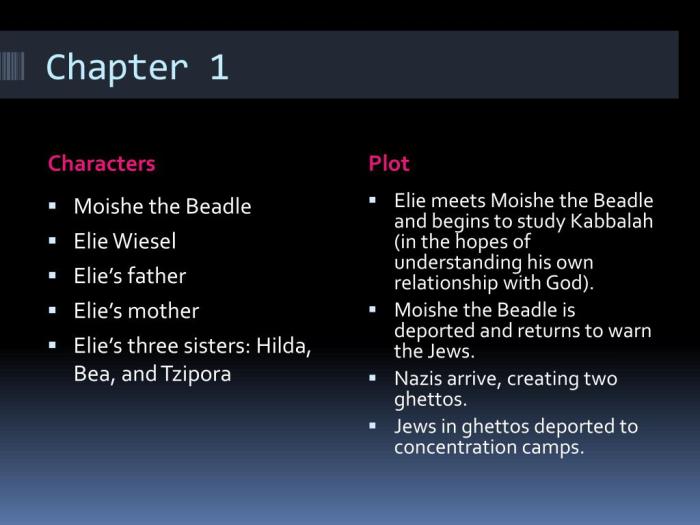
In Auschwitz, prisoners faced unimaginable horrors and struggled to survive amidst inhumane conditions. The Nazis employed systematic methods to control and demoralize them, testing the limits of human endurance and resilience.
Harsh Living Conditions and Daily Routine
- Prisoners were forced to live in overcrowded barracks, sleeping on wooden bunks with little privacy or sanitation.
- They were subjected to constant hunger, with meager rations that barely sustained them.
- Their daily routine was regimented and brutal, involving forced labor, roll calls, and beatings.
- Medical care was nonexistent, and prisoners suffered from disease, malnutrition, and exhaustion.
Methods of Control and Demoralization
- The Nazis used psychological warfare, including propaganda, humiliation, and terror, to break the prisoners’ spirits.
- They employed a system of informers and collaborators to sow distrust and fear among the prisoners.
- They imposed arbitrary rules and punishments, creating a climate of uncertainty and paranoia.
- They stripped prisoners of their possessions, identities, and dignity, reducing them to mere numbers.
Struggles to Maintain Humanity and Hope
Despite the horrors they endured, many prisoners fought to maintain their humanity and hope. They formed clandestine groups for support and resistance.
- They shared stories, sang songs, and engaged in intellectual discussions to preserve their sense of self.
- They risked their lives to help fellow prisoners, demonstrating compassion and solidarity.
- They clung to their beliefs and values, finding strength in their faith or inner resilience.
The Role of Eliezer’s Father
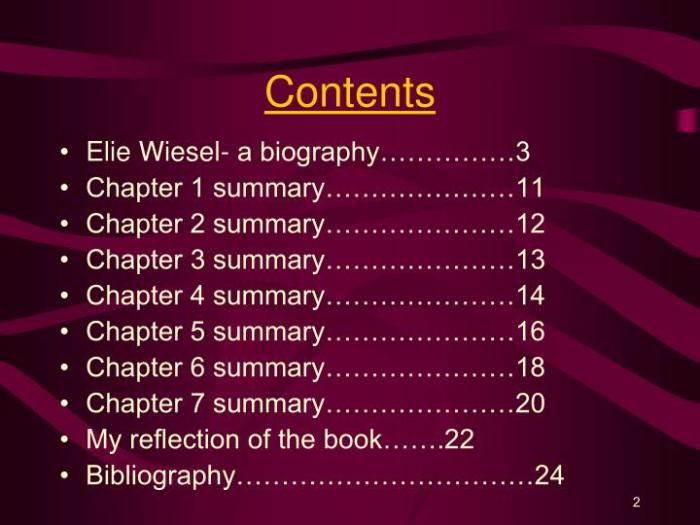
Eliezer’s father, Shlomo, plays a pivotal role in his son’s experience at Auschwitz. Their relationship is complex and evolves throughout the narrative.
Inspiration and Resilience
Shlomo’s unwavering faith and resilience inspire Eliezer. He maintains his dignity and humanity despite the horrors they face. Eliezer draws strength from his father’s example, which helps him endure the physical and emotional challenges of the camp.
Sustaining Eliezer
Shlomo’s presence and support sustain Eliezer. He provides emotional and physical comfort, offering guidance and encouragement. Shlomo’s determination to survive gives Eliezer hope and the will to continue.
Impact of Death
Shlomo’s death has a profound impact on Eliezer. He feels abandoned and alone. The loss of his father shatters his sense of hope and faith. Eliezer’s struggle to reconcile his father’s death with his belief in God becomes a central theme of the narrative.
The Liberation of Auschwitz
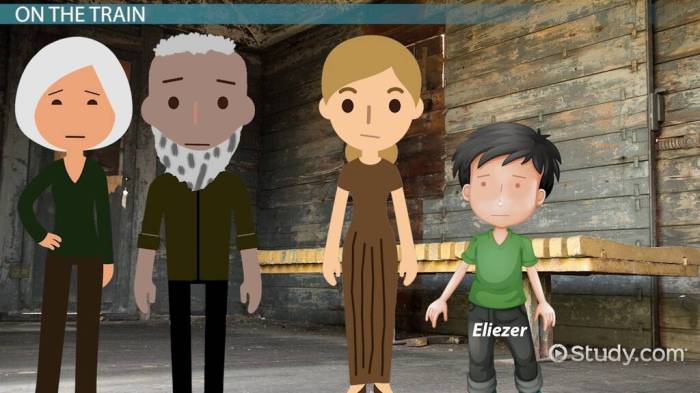
As the Soviet Army approached Auschwitz in January 1945, the prisoners were in a state of physical and emotional devastation. They were emaciated, diseased, and traumatized by the horrors they had endured.
When the camp was finally liberated on January 27, 1945, the prisoners were overwhelmed with relief and disbelief. However, their liberation was not the end of their suffering. They faced many challenges in adjusting to life after Auschwitz.
Physical Challenges
- The prisoners were physically weak and malnourished. They had to be gradually reintroduced to food and exercise.
- Many prisoners suffered from diseases such as typhus and tuberculosis. They required extensive medical care.
- The prisoners had lost their homes and families. They had to find new places to live and rebuild their lives.
Emotional Challenges
- The prisoners were traumatized by their experiences in Auschwitz. They had witnessed unspeakable horrors and lost loved ones.
- Many prisoners felt guilty for surviving while others had died. They struggled to come to terms with their own survival.
- The prisoners had difficulty trusting others after the betrayal and cruelty they had experienced in Auschwitz.
The Lasting Impact of the Holocaust, Night elie wiesel chapter 2 summary
The Holocaust had a profound impact on Eliezer and other survivors. They never forgot the horrors they had witnessed and the loved ones they had lost.
The Holocaust shaped Eliezer’s writing and his life’s work. He dedicated his life to speaking out against intolerance and hatred.
Essential Questionnaire: Night Elie Wiesel Chapter 2 Summary
What is the significance of the prisoners’ loss of identity in Chapter 2?
The loss of identity is a deliberate attempt to dehumanize the prisoners, making them feel powerless and disposable.
How does Eliezer’s relationship with his father sustain him during his imprisonment?
Eliezer’s father provides him with emotional support, guidance, and a sense of purpose, helping him to endure the unimaginable.
What are the lasting effects of the Holocaust on Eliezer and other survivors?
The Holocaust leaves deep psychological and emotional scars on Eliezer and other survivors, affecting their relationships, beliefs, and overall outlook on life.
